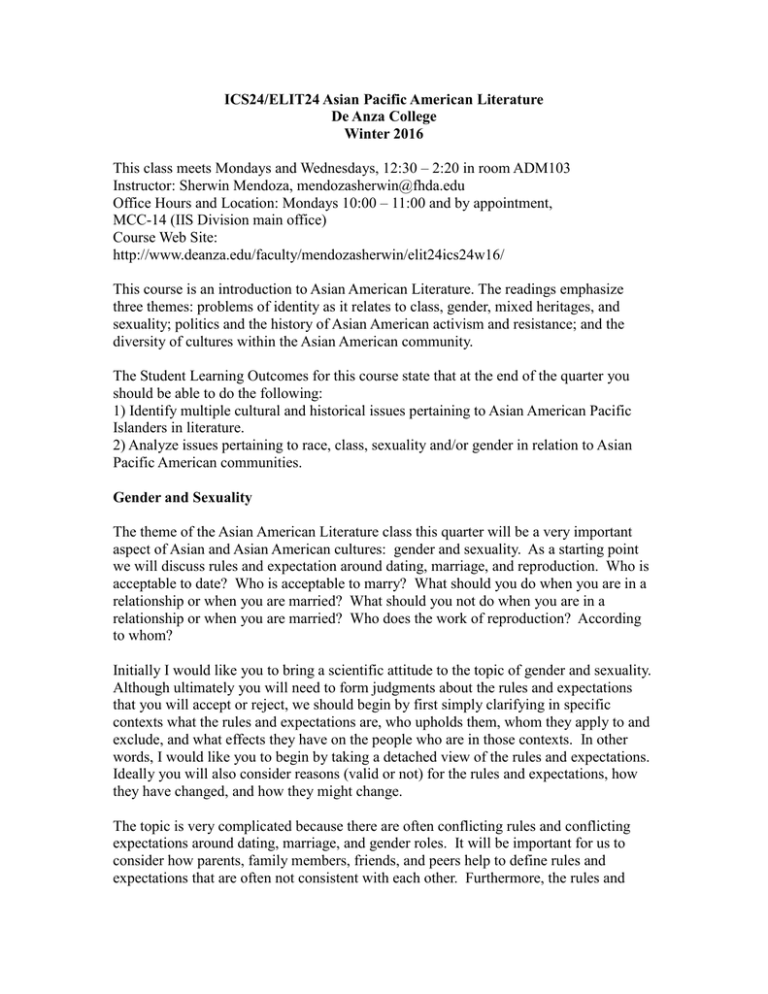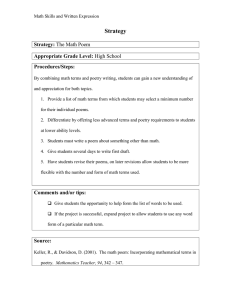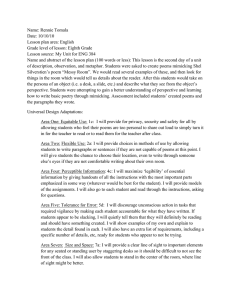ICS24/ELIT24 Asian Pacific American Literature De Anza College Winter 2016
advertisement

ICS24/ELIT24 Asian Pacific American Literature De Anza College Winter 2016 This class meets Mondays and Wednesdays, 12:30 – 2:20 in room ADM103 Instructor: Sherwin Mendoza, mendozasherwin@fhda.edu Office Hours and Location: Mondays 10:00 – 11:00 and by appointment, MCC-14 (IIS Division main office) Course Web Site: http://www.deanza.edu/faculty/mendozasherwin/elit24ics24w16/ This course is an introduction to Asian American Literature. The readings emphasize three themes: problems of identity as it relates to class, gender, mixed heritages, and sexuality; politics and the history of Asian American activism and resistance; and the diversity of cultures within the Asian American community. The Student Learning Outcomes for this course state that at the end of the quarter you should be able to do the following: 1) Identify multiple cultural and historical issues pertaining to Asian American Pacific Islanders in literature. 2) Analyze issues pertaining to race, class, sexuality and/or gender in relation to Asian Pacific American communities. Gender and Sexuality The theme of the Asian American Literature class this quarter will be a very important aspect of Asian and Asian American cultures: gender and sexuality. As a starting point we will discuss rules and expectation around dating, marriage, and reproduction. Who is acceptable to date? Who is acceptable to marry? What should you do when you are in a relationship or when you are married? What should you not do when you are in a relationship or when you are married? Who does the work of reproduction? According to whom? Initially I would like you to bring a scientific attitude to the topic of gender and sexuality. Although ultimately you will need to form judgments about the rules and expectations that you will accept or reject, we should begin by first simply clarifying in specific contexts what the rules and expectations are, who upholds them, whom they apply to and exclude, and what effects they have on the people who are in those contexts. In other words, I would like you to begin by taking a detached view of the rules and expectations. Ideally you will also consider reasons (valid or not) for the rules and expectations, how they have changed, and how they might change. The topic is very complicated because there are often conflicting rules and conflicting expectations around dating, marriage, and gender roles. It will be important for us to consider how parents, family members, friends, and peers help to define rules and expectations that are often not consistent with each other. Furthermore, the rules and expectations move far beyond the people we are in immediate contact with. It will thus be important for us to consider the influences on rules and expectations that others bring to us and the roles of cultural institutions and states in creating rules and expectations. Finally, we should consider how rules and expectations around gender and sexuality are related to socioeconomic class and the discourses and structures that form race. Course Policies Attendance is mandatory. All class time counts and attendance every day is required. Please contact me before class if you are unable to attend, and we will set up a way for you to make up the missed class time. Please respect my time and the time of your classmates by coming to class on time. Please turn in assignments on time to make it easier for me to track the progress of everyone in the class. Participation is very important for me because I think of this class as a team-taught class, where you participate in the educational experience of your classmates. This course will abide by the college-wide policies of De Anza College with respect to academic conduct (honesty, respect for diversity, etc.). Course Options In this class you will have two options for studying Asian American Literature: Option 1: Produce a poetry video Option 2: Participate in a seminar on Asian American Literature Option 1: Produce a Poetry Video Course Texts All course texts will be free and available online. Additionally, you will read poems written by your classmates and watch videos produced by your classmates. Course Schedule Unit I: Telling Your Story January 4, January 6 In-class writing assignment on a specific conflict you have had or someone in your family has had with regard to gender and/or sexuality. January 11, January 13 Telling Your Story Form groups Select an option Unit II: Poetry January 18, January 20 Holiday January 18 Poem 1 due January 25, January 27 Poem 2 due February 1, February 3 Poem 3 due Unit III: Video Production February 8, February 10 Select poem or poems for video Assign roles and begin planning your video projects February 15, February 17 Holiday February 15 Storyboards February 22, February 24 Recording February 29, March 2 Recording March 7, March 9 Recording March 14, March 16 Video due, final exam review Final Exam: Wednesday, March 23, 11:30-1:30 Grading Telling Your Story Presentation and Write-up: 15% Poem 1: 15% Poem 2: 15% Poem 3: 15% Video Project: 30% Final Exam: 10% Telling Your Story During the second week of the quarter you will present your story to a small group in the class (preferably four or five people per group). The story you present will be a story about how you have learned about rules and expectations with regard to gender and sexuality. Poems You will write three poems that you will present to your group. For your group's video project you will select one or more poems written by people in your group to showcase in your video. Although I want you to begin with a scientific attitude, you will have to depart from this to a certain extent as you write your poems. In contrast to a scientific attitude, which is detached and objective, your poems should be written from your own circumstances and from the webs of relationships that surround you. The series of poems that you and your fellow group members produce should build on each other. Your first poem will go into detail about a specific instant when you learned about the significance of some aspect of gender and/or sexuality. Hopefully you can generate the poem from a line from your Telling Your Story assignment. In your second poem you will take a line or image from someone else's poem to write about a specific instant within your own life. In your third poem you will select a different line or image to be the focal point. The third poem does not need to be focused on gender and/or sexuality. Video Projects The assignments for this class will build towards video projects. The class begins with you telling your story, and aspects of your story will hopefully become the basis for poems you will write. You will form groups for the video production unit of this course, and you will select one or more poems from your group to become the poem or poems recited in your video. Finally, your poems will be uploaded and archived on the De Anza Asian American Literature YouTube channel. Option 2: Seminar on Asian American Literature I recommend this option to you only if you are interested in a career involving literature. The format of this option is similar to graduate-level courses in Asian American Literature. The reading requirement will be substantial, and I will expect you to actively engage with the course texts and the thoughts on the texts of other participants in the seminar. I will evaluate the writing requirement with the degree of rigor you should expect to find in an upper-division literature course at a 4-year university. Course Texts After examining syllabi from Asian American Literature courses taught at several US universities the seminar participants will decide on two texts to read. We will select either two novels or one novel along with a text belonging to another genre such as a collection of short stories or a collection of poems. Preferably, the texts will be available electronically from Amazon. Course Schedule Note: After January 13 students who choose this option will meet at a different time and location from the students who selected Option 1. Unit I: Telling Your Story January 4, January 6 In-class writing assignment on a specific conflict you have had or someone in your family has had with regard to gender and/or sexuality. January 11, January 13 Telling Your Story Select an option; decide on a meeting time for the literature seminar Unit II: Asian American Literature as an institution Week of January 18 Review Syllabi Decide on course texts and obtain access to course texts Unit III: Read and discuss literary texts Week of January 25 Begin reading the first text Week of February 1 Finish reading the first text Responses due Week of February 8 Begin reading the second text Week of February 15 Finish reading the second text Responses due Unit IV: Analytical Essay Week of February 22 Research, topic, thesis Week of February 29 Writing workshop Week of March 7 First draft of analytical essay due Week of March 14 Final draft of analytical essay due Final Exam: Wednesday, March 23, 11:30-1:30 Grading Telling Your Story Presentation and Narrative: 10% Presentation on a possible course text: 10% Response 1 (Two pages): 20% Response 2 (Two pages): 20% Final draft of Analytical Essay (Five-Seven Pages): 30% Final Exam: 10%




